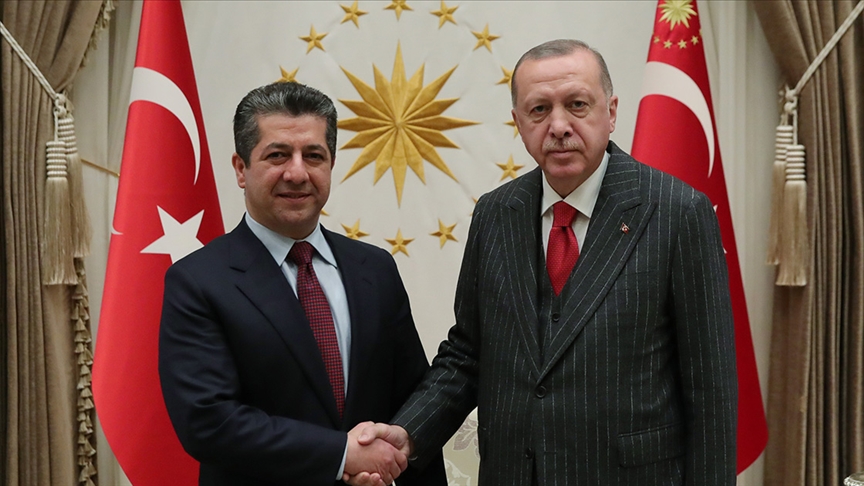Türkmen Terzi
The ongoing war in Ukraine poses great economic and security risks to Turkey, with Russian troops controlling large stretches of Ukraine’s Black Sea coast and Turkey’s investments with both Russia and Ukraine already at risk. Due to his close relationship with Vladimir Putin, Turkish President Recep Tayyip Erdoğan has had to navigate Turkey’s foreign policy during the war with extreme caution. On the other hand, the Turkish leader is pursuing a policy of radical pragmatism targeting Kurds in northern Iraq while negotiating with Israel and Iraq’s autonomous Kurdistan Regional Government (KRG) to transport oil and gas to Europe via Turkey.
Erdoğan’s Justice and Development Party (AKP) has been trying to keep Turkey neutral in world diplomacy since the beginning of the war in Ukraine, playing the role of mediator as a Black Sea neighbor of both Ukraine and Russia. Turkey has been opposing sanctions against Russia, and many Russians including oligarchs have begun settling in Turkey to avoid sanctions against them. “In terms of sanctions, we are studying certain UN guidelines, but let’s not forget that we cannot put aside our relations with Russia. If we take natural gas alone, about half the natural gas we use comes from Russia. Besides that, we are building our Akkuyu nuclear power plant with Russia,” Russia’s Tass News agency quoted Erdoğan as saying on March 25. Erdoğan bought the Russian S-400 surface-to-air missile defense system despite NATO’s strong opposition. Turkey also continued business with Russia since the country is a vital trading partner for the beleaguered Turkish economy. Turkey, however, also continues to maintain a close relationship with Ukraine as Erdoğan and Ukrainian President Volodymyr Zelensky have met several times in recent years. The Ukrainian army has also successfully used the Turkish Bayraktar TB2 combat drone against Russia.
It is important for both Russia and Ukraine to maintain good relations with Ankara as Turkey is an important business ally for them and a regional power. Moreover, Turkey controls the Bosporus and the Dardanelles straits, which are the only sea passages through which Russia can gain access to the Mediterranean. The 1936 Montreux Convention allows Turkey to restrict the passage of civilian vessels and military warships from transiting the straits between the Black Sea and the Mediterranean during wartime.
Turkey’s military role as a NATO member is more important than ever as Russia threatens Europe. Amid the chaos, Erdoğan, who is well known for using crisis and chaos to his advantage, is now working on a natural gas pipeline project from Iraqi Kurdistan to Turkey and Europe. Erdoğan plans on turning the Ukraine crisis into an opportunity as Europe tries to reduce its energy dependence on Russia. Turkish journalist Mehmet Ali Güller claimed in the Cumhuriyet newspaper on April 18 that the US government supports Erdoğan’s energy deals with Israel and the Iraqi Kurdish leaders. Erdoğan hosted KRG President Nechirvan Barzani in Turkey on Feb. 2 in Ankara and again on March 12 during the Antalya Diplomacy Forum.
Turkish Defense Minister Hulusi Akar also met with President Barzani and KRG Prime Minister Masrour Barzani during the Munich Security Conference on Feb. 18. Masrour Barzani then made an unannounced visit to İstanbul on April 15, where he and Erdoğan discussed “bilateral relations and regional developments.” Following Erdoğan’s meeting with Barzani, Turkey began a fresh cross-border offensive known as “Operation Claw Lock” against the outlawed Kurdistan Workers’ Party (PKK) early on April 18, and Turkish warplanes and drones have since targeted PKK fighters in the regions of Metina, Zap and Avasin-Basyan of Duhok province in the Kurdistan region. The PKK is recognized as a terrorist organization by Turkey, the US and the EU and has bases in northern Iraq, from where it targets Turkey. The PKK and many other Kurdish groups criticized the KRG for allowing Turkey to bomb the PKK bases.
The frequency with which Erdoğan has met with Barzani is not as surprising as his hosting of Israeli President Isaac Herzog in Ankara in March. Erdoğan became fiercely critical of Israel after Israeli commandos stormed the Mavi Marmara, killing 10 Turkish activists on board. The Mavi Marmara was the lead ship in a six-vessel aid convoy attempting to breach the blockade of Gaza on May 31, 2010.
Several media outlets reported that a Turkey-Israeli gas pipeline had been discussed in the meeting as an alternative to Russian energy supplies. Erdoğan told journalists on a return flight from Ukraine that “Turkey and Israel can work together to carry Israeli natural gas to Europe,” according to a TRT World report on Feb. 4. Turkey is hopeful about building a gas pipeline with Israel since the US confirmed its withdrawal of support from the EastMed gas pipeline project. Greece, Israel and the Greek Cypriot administration signed an agreement in 2020 to build a 1,900-kilometer (approximately 1,200 mile) natural gas pipeline in the eastern Mediterranean to transport Israeli natural gas to the European market via the Mediterranean Sea and Greece. Turkey opposed this project as the sovereign rights of both Turkey and the Turkish Cypriots in the eastern Mediterranean were being violated in the agreement.
The Turkish economy is currently in the midst of a huge crisis, and Erdoğan wants to offer alternative energy deals to Europe by transporting Iraqi and Israeli gas. And while Europe and the US’s attention remains on Ukraine, Turkish forces have begun targeting the PKK in Iraq. The US and Europe recognize the PKK as a terrorist group but support Kurdish armed groups fighting against the Islamic State in Iraq and the Levant (ISIL). Turkey’s attacks on the Kurds are unlikely to go unnoticed by Europe despite the Ukraine crisis. Masrour Barzani was already in the UK to meet with his British counterpart, Boris Johnson, and other senior British officials on April 18, the same day Turkey launched military operations in northern Iraq.



